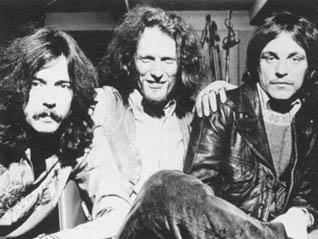
Cream has been described as “the greatest trio in rock music.” From left: Clapton, Baker, and Bruce.
During its brief existence, the British rock group Cream provided a perfect soundtrack for the psychedelic era and created the foundations for the progressive rock movement. It also launched Eric Clapton, who later blossomed as a solo artist.
Formed in 1966, Cream consisted of vocalist and guitarist Clapton (b. Eric Clapp, March 1945), lead vocalist and bassist Jack Bruce (b. John Asher, May 1943), and drummer Ginger Baker (b. Peter Baker, August 1939). Despite Clapton’s much-admired guitar skills, he in no sense overshadowed Bruce and Baker, who also had strong pedigrees. Clapton had been a member of two beat groups: John Mayall’s Bluesbreakers and the Yardbirds. Bruce had also played in the Bluesbreakers and in the group Manfred Mann, and Baker had drummed with some of the most respected bands on the London scene.
Cream’s radical sound—a heavily amplified mix of jazz, blues, and R&B—was enhanced by experiments with new techniques, such as feedback, wah-wah pedal, and eight-track overdubbing. Lyrics such as “You’ve got that rainbow feeling but the rainbow has a beard” show that LSD also played a part. Constant personal tensions, mainly between Bruce and Baker, also gave the music greater dramatic emphasis.

Cream has been described as “the greatest trio in rock music.” From left: Clapton, Baker, and Bruce.
The trio’s albums, Fresh Cream (1967), Disraeli Gears (1967), and Wheels of Fire (1968), exemplify a group prepared to push the boundaries of contemporary music beyond the obligatory three-minute single that was aimed solely at achieving a spot on the charts. They were particularly admired in the U.S., where they toured extensively. Despite their continuing popularity, the trio split up in 1968. Clapton later said he decided to quit Cream when he saw a devastating criticism, written by Jon Landau in Rolling Stone magazine, of the band’s self-indulgent, increasingly directionless instrumental solos. The 1969 album Goodbye contained some songs recorded live on their farewell tour.
As a solo artist, Clapton enjoyed the greatest success of the trio. He had always been a blues fan: Cream’s interpretations of Robert JOHNSON’S “Crossroads,” and Willie DIXON’S “Spoonful” are among the most spirited rock interpretations of the blues. Clapton would return to the blues many times in the years after Cream, but first he founded Blind Faith with Bruce, then Derek and the Dominoes. With the latter, he created an exceptional album, Layla and Other Assorted Love Songs (1970). After a period of crippling heroin dependency in the early 1970s, Clapton achieved sustained success as a solo artist with such albums as Slowhand and Journeyman. In 1992, his Eric Clapton Unplugged was one of the best examples of the acoustic performances showcased by MTV.
Despite his solo success, Clapton has never reached the experimental heights achieved with Cream. Three decades after its demise, the group continues to inspire emerging rock musicians.
Graham McColl
SEE ALSO:
AMPLIFICATION; BRITISH BEAT MUSIC; HEAVY METAL; HENDRIX, JIMI; PROGRESSIVE ROCK; ROCK MUSIC.
FURTHER READING
Piatt, John. Disraeli Gears: Cream (New York: Schirmer Books, 1998);
Schumacher, Michael. Crossroads: The Life and Music of Eric Clapton (New York: Hyperion, 1995).
SUGGESTED LISTENING
Disraeli Gears; Eric Clapton Unplugged; Fresh Cream; Wheels of Fire.